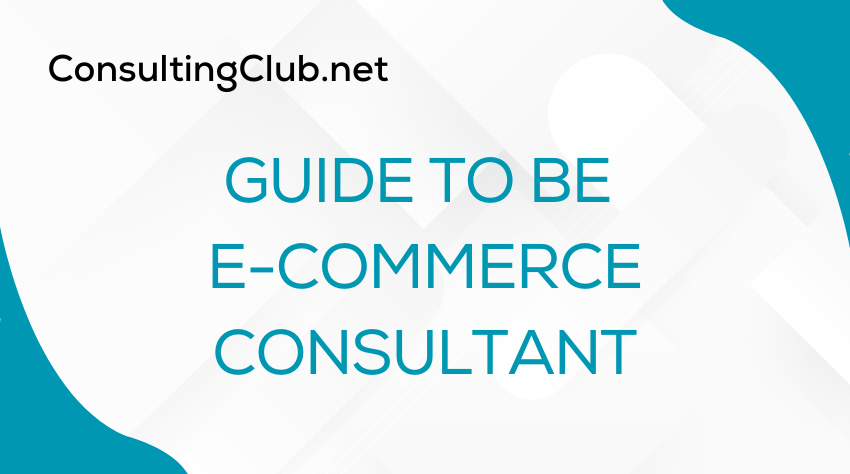E-commerce is a booming industry, with global online sales projected to exceed $7 trillion by 2025. Businesses of all sizes are seeking expert guidance to navigate the competitive online marketplace, making e-commerce consulting a lucrative and rewarding career choice. If you have expertise in digital marketing, website optimization, or supply chain management, this guide will help you establish yourself as a successful e-commerce consultant.
What Does an E-Commerce Consultant Do?
An e-commerce consultant provides strategic advice and hands-on support to businesses looking to improve their online sales and presence. Responsibilities may include:
- Market Research: Analyzing industry trends and customer behavior to identify opportunities.
- Platform Selection: Helping businesses choose the right e-commerce platform (e.g., Shopify, Magento, WooCommerce).
- Website Optimization: Enhancing website design, user experience (UX), and performance to increase conversions.
- Digital Marketing: Developing and executing strategies for SEO, PPC, social media, and email marketing.
- Inventory and Fulfillment: Streamlining inventory management and fulfillment processes.
- Analytics and Reporting: Measuring performance and making data-driven recommendations.
Skills and Qualifications Required
To succeed as an e-commerce consultant, you need a blend of technical, analytical, and interpersonal skills:
- Technical Expertise:
- Proficiency in e-commerce platforms and tools.
- Knowledge of website development basics (HTML, CSS, CMS).
- Marketing Skills:
- Expertise in SEO, content marketing, and social media advertising.
- Experience with paid advertising platforms (Google Ads, Facebook Ads).
- Analytical Abilities:
- Familiarity with tools like Google Analytics, SEMrush, or Ahrefs.
- Ability to interpret data and create actionable insights.
- Business Acumen:
- Understanding of supply chain logistics and customer retention strategies.
- Financial literacy to assess ROI and profitability.
- Soft Skills:
- Strong communication and presentation skills.
- Project management capabilities to handle multiple clients effectively.
Steps to Become an E-Commerce Consultant
1. Build Your Expertise
Start by gaining hands-on experience in e-commerce. This can be through:
- Managing your own online store.
- Working in roles like digital marketing, web development, or product management for an e-commerce business.
2. Obtain Relevant Certifications
Certifications can validate your skills and make you more attractive to clients. Consider:
- Google Ads and Analytics Certifications
- HubSpot Inbound Marketing Certification
- Shopify Partner Academy
- Facebook Blueprint Certification
3. Define Your Niche
E-commerce is a broad field. Specializing in a niche can set you apart. For example:
- Fashion and apparel e-commerce
- B2B e-commerce solutions
- Sustainable and eco-friendly brands
4. Build a Portfolio
Showcase your expertise through a strong portfolio. Include:
- Case studies of past projects.
- Metrics showcasing your impact (e.g., increased sales, improved conversion rates).
- Testimonials from satisfied clients.
5. Establish Your Brand
Develop an online presence to attract clients:
- Website: Create a professional website outlining your services and expertise.
- Blog: Share valuable content related to e-commerce trends and tips.
- Social Media: Use LinkedIn, Twitter, and Instagram to network and share insights.
6. Network and Market Yourself
Expand your professional network to gain referrals and opportunities:
- Attend e-commerce and digital marketing conferences.
- Join online communities and forums like Reddit and LinkedIn groups.
- Partner with agencies or other consultants.
7. Deliver Exceptional Results
Word-of-mouth referrals are critical in consulting. Ensure you exceed client expectations by:
- Setting clear goals and timelines.
- Communicating regularly and transparently.
- Continuously learning to stay ahead of industry trends.
Challenges and How to Overcome Them
1. Keeping Up with Industry Changes
- Solution: Follow industry blogs, attend webinars, and take continuous education courses.
2. Building Trust with Clients
- Solution: Offer free initial consultations and provide measurable results to establish credibility.
3. Managing Multiple Clients
- Solution: Use project management tools like Trello or Asana to stay organized.
Conclusion
Becoming an e-commerce consultant is an exciting and profitable career path for those with a passion for digital business. By building expertise, defining a niche, and delivering measurable results, you can position yourself as a trusted advisor in this thriving industry. With dedication and strategic planning, the opportunities are limitless.

